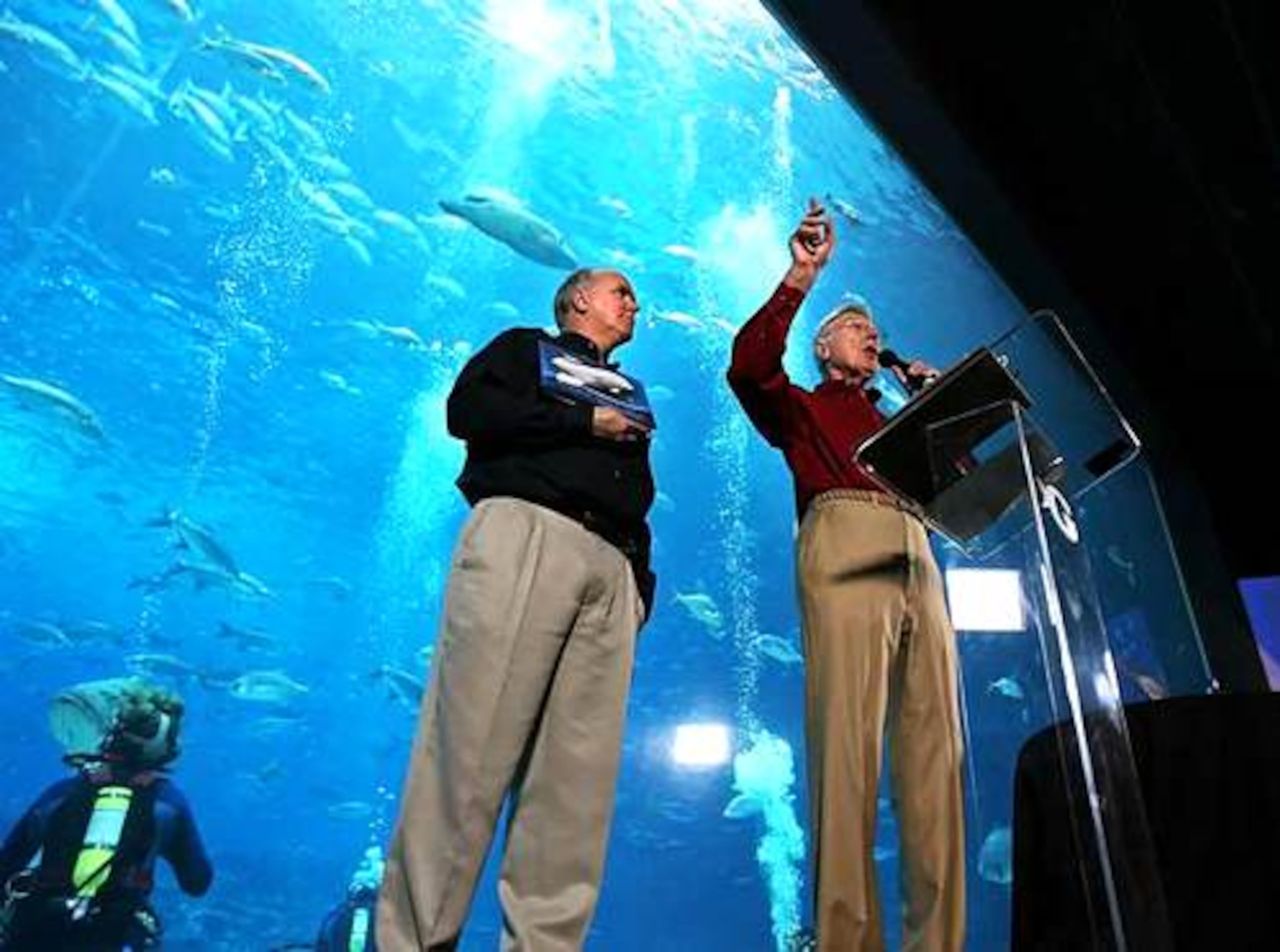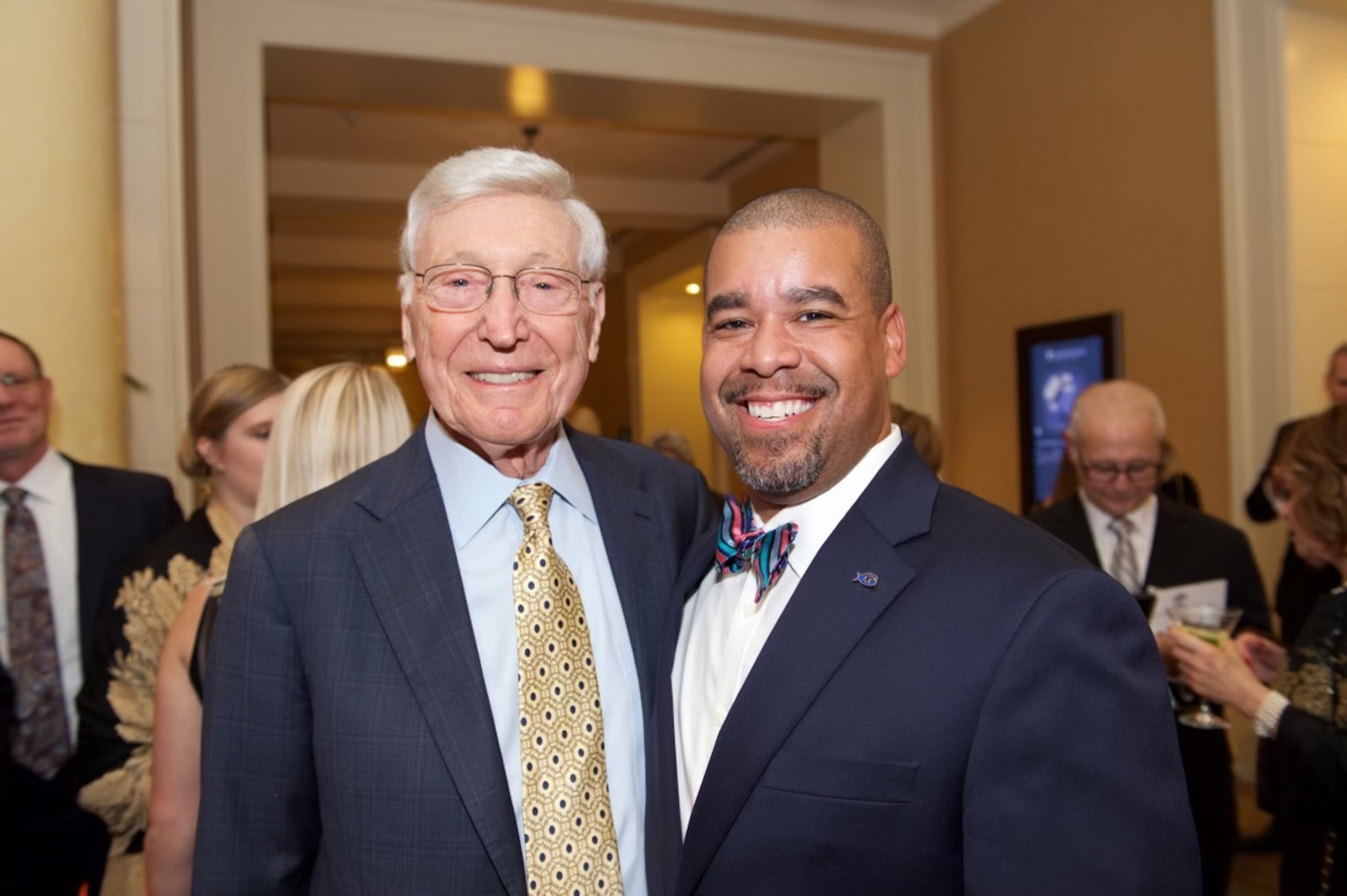Bernie Marcus, cofounder of Home Depot, dies

He was lousy with tools but built the world’s largest chain of hardware stores. He never owned a home aquarium but created the planet’s biggest fish tank.
Bernard Marcus, the larger-than-life billionaire everyone called “Bernie,” died Monday night at his home in Boca Raton, Florida, according to Jay Kaiman, the president of The Marcus Foundation.
No cause of death was disclosed. Marcus was 95. Funeral services will be held Thursday afternoon in Atlanta.
Marcus, the son of impoverished Jewish immigrants, cofounded the Atlanta-based Home Depot chain of home-improvement stores.
He also masterminded and financed downtown’s Georgia Aquarium and supported a multitude of charitable causes, such as the Marcus Jewish Community Center of Atlanta and the Marcus Autism Center. And he poured millions of dollars into stroke research and treatment, as well as help for veterans and first responders with traumatic brain injuries, post-traumatic stress and substance abuse issues.
Later in life he publicly committed to giving away the majority of his remaining wealth. By late 2024, his foundation said it had donated well over $2 billion.
“We’re all just a blip on the screen,” Marcus told The Atlanta Journal Constitution as he prepared to open his beloved aquarium in late 2005. “I think I would like people to remember me for what I did, for my attempt to leave the world a better place. I’d like to know I made an impact.”
Marcus, who grew up in New Jersey but called Atlanta home after opening his first Home Depot stores here in the late 1970s, was a man drawn to big ideas. When Home Depot was just a handful of struggling outlets, Marcus courted dubious investors with hand-waving tales of a 2,000-store chain. When the Georgia Aquarium was just an empty lot, he talked to anyone who would listen about its potential to revive downtown and generate international headlines.
“I wanted something unique, something that would last for generations,” Marcus said of the aquarium. He poured into it an initial $250 million of his Home Depot fortune.
Marcus said he built the aquarium as a thank you to the people of Georgia who helped make his early Home Depot stores a success and also made him one of the richest men in the United States. His “gift” placed him among the ranks of Georgia’s biggest civic donors.
“A lot of people think big, but they are just visionaries and not doers,” said Johnny Isakson, the late senator from Georgia who knew Marcus for decades. “Bernie not only (had) the vision, he could do the hard work to make the vision become a reality.”
Marcus in later years spent much of his time shuttling between homes in Atlanta, South Florida and North Carolina. He had been in ailing health over the last year and a half and had previously endured surgery for heart valve issues. More recently, he had undergone surgery for hip issues.
With his health in decline, in recent months he had scaled back how many hours he spent each day working with his foundation as he methodically tried to give away much of his wealth. He stopped playing golf, and he and Billi, his wife of the last 50 years, sold their cherished lake home in western North Carolina. In recent weeks his condo in Atlanta was also put up for sale.
Gov. Brian Kemp was among those who paid tribute Tuesday to Marcus’ impact on Georgia and beyond.
“An icon of the business world who created jobs and opportunity for generations of The Home Depot employees, his considerable philanthropy will also reverberate through history, touching lives for the better,” Kemp said in a statement.
A born showman who never met a microphone he didn’t like, Marcus was an eternal optimist.
“I love getting up in the morning,” he said not long after his 76th birthday. “When I go to bed at night, I thank God that I made it through the day and accomplished some stuff. And when I get up in the morning I say, ‘Thank you.’”
He could work a room like a veteran politician, but he could also be a tough-as-nails negotiator. He had boundless energy and was so detail-oriented that he often rankled subordinates, who found him overly controlling. He was also a worrier, a man who fretted about the small stuff.
“If you’re satisfied and you think you’ve done everything, then you’re a fool,” Marcus said. “I’m a great believer in Murphy’s law. We have to stay constantly vigilant.”
Home Depot co-founder Arthur Blank saw both sides of Marcus — the buoyant, wisecracking leader of company pep rallies and the behind-the-scenes hand wringer.
“He’s always had a cheerleading personality,” Blank said. “He’s always been positive about things. When he would let his hair down about not feeling good about the world … it was usually behind closed doors.”
On the surface Marcus was warm and outgoing, but he could be intensely secretive. During his Home Depot days, Marcus had a saying: Don’t advertise the hammer until the hammer is on the shelf.
His approach to the Georgia Aquarium was much the same, as he played a cat-and-mouse game with reporters about how big the facility would be and what its tanks would hold even as its front entrance rose like a ship’s bow over Centennial Olympic Park.
Marcus himself was a big fish in Republican political circles.
He gave millions of dollars to GOP efforts. He was courted by major players in the party. When the president came to town, Marcus was often close by.
He took a particular behind-the-scenes and, sometimes, public role in supporting Donald Trump’s presidential campaigns in 2016, 2020 and 2024, though at times he said the fellow billionaire was not his top choice among early Republican candidates. From the 2016 to 2024 election cycles he gave more than $70 million in federal political contributions, particularly to Republican causes and campaigns, according to data from OpenSecrets.
“Generally, I’m a supporter of the free enterprise system,” Marcus said. “I believe the Republicans better respond to that. Creating jobs is more important than giving people a handout.”
Marcus was born on May 12, 1929, to Jewish parents who had fled persecution in Russia only to land in a fourth-floor tenement in Newark, New Jersey. Marcus remembers an early life surrounded by a supportive, loving family that instilled in him a sense of hard work and charity.
“My mother used to call it ‘the golden land’ in Yiddish,” Marcus said. “We had cockroaches. We had mice. But this was heaven to them compared to what they came from.”
“She had this Jewish word, ‘besheret,’ which means ‘it’s destined,’” Marcus said. “Some people read it as destined to be a disaster. With my mother, it was destined to be good. If somebody died, my mother could find something good in it. You know, ‘He’s not suffering anymore. The family couldn’t deal with any more.’ Pretty soon, you would say, ‘Thank God, the guy died.’ She would convince you that dying had its benefits.”
His mother would often take money put aside for the children’s snacks, he said, and give it to the less fortunate. He credits her with his philosophy of giving back to the community.
The man who would one day oversee a home-improvement empire showed little ability with tools when he helped his father, a cabinetmaker who worked 15-hour days to put food on the table for his wife and four children.
“I would try to help him build these things, and he would take out every nail I put in,” Marcus said. “My father was a perfectionist, and I couldn’t satisfy him.”
Marcus’ mother pushed him to get a pharmacy degree from Rutgers University when he could not get into medical school. He tried being a druggist, but he gravitated toward the business end of things.
“I love retailing,” he once said. “I love dealing with customers. I love dealing with the psyches of customers. I don’t like the financial end of the business. I never did.”
He worked a series of retail jobs, eventually landing as a top executive with Handy Dan Improvement Centers, a successful chain of Los Angeles-based hardware stores.
Marcus’ meteoric rise began as he was approaching his 50th birthday, when he and Blank were abruptly fired after a run-in with their boss in 1978.
“Bernie got whacked,” Blank said in a 2005 interview, “and I got whacked at the same time.”
Wall Street financier Ken Langone said Marcus, who had helped build Handy Dan, struggled to make sense of being cast to the sidewalk in middle age.
“He had a family. He had no money,” Langone said. “Down. I don’t know how much lower you could be.”
Langone, a flamboyant New York investor who had met Marcus when Langone represented a group of investors interested in buying Handy Dan, reminded Marcus of the what-if chats they’d had. Those talks were ones in which Marcus sketched out his vision for a chain of home-improvement stores bigger and cheaper than anything that existed.
“I said, ‘You’ve been kicked in the ass with a golden horseshoe,’” Langone recalled. “He said, ‘What do you mean?’ I said, ‘You know that thing you’ve been hinting at. Let’s do it.’”

There were serious early missteps, beginning with a disastrous pitch meeting with Texas billionaire business owner H. Ross Perot. Marcus and Blank desperately needed $2 million to get their business airborne. If Perot would hand over the cash, he would own 70% of the new company.
Blank, who calls Perot a “great American,” described the meeting in which he and Marcus made a presentation to Perot to iron out details. Blank coldly went through the numbers; the high-energy Marcus talked breathlessly about the big picture and threw in a few jokes. Perot, who ran his technology company — Electronic Data Systems — with military discipline, never cracked a smile.
“He made it clear at one point that no facial hair would be acceptable,” said Blank, who sported a mustache.
Then the discussion turned to cars.
Marcus said he was driving a four-year-old Cadillac that he wanted to carry over onto the new company’s books. Perot, in his thick Texas drawl, told him to get a Chevy.
“My people don’t drive Cadillacs,” Marcus, in the book “Built From Scratch,” recalled Perot as saying. Marcus argued the used Caddy would be cheaper.
“My people don’t drive Cadillacs,” Perot responded.
Marcus said any chance of a deal died there. If they couldn’t agree on a used car, there would certainly be bigger problems.
Perot remembered things differently.
“I was not that interested in investing in retail stores, and also (Walmart founder) Sam Walton was a good friend of mine, and I didn’t want to get Sam upset by helping build a competitor,” Perot said.
Reminded of Marcus’ used-Cadillac-kills-the-deal story, Perot paused and replied curtly, “Everybody has their own stories.”
Marcus and Blank finally got the startup money from a group of investors Langone cobbled together. One of the wildest rides in retailing history was about to bolt from the starting gate. There was even an early proposal to call the new enterprise “Bad Bernie’s Buildall.”
At times, the ghost of P.T. Barnum seemed to swirl about the enterprise.
During the early days, when crowds failed to flock to the first Home Depot stores in Atlanta, Marcus dispatched his children into the parking lots with wads of $1 bills.
“Bernie came up with the idea of giving people a dollar bill if they’d just go in and look at the store,” Langone said.
When they didn’t have enough money to fill their cavernous stores with inventory, they used empty boxes and empty paint cans to feign abundance.
Marcus was the tireless cheerleader and a natural salesperson. He was passionate and he really cared about people — customers and employees — Blank said.
Langone kept the money flowing, and Blank was the no-nonsense accountant who kept the careening retail operation between the ditches.
“Bernie, he would say things in terms of the stock — in terms of the size of the company, the size of the industry, the size of the market — that had no foundation whatsoever,” Blank said. “But half the time, half what he said ended up becoming reality.
“People always took a little bit of it with a grain of salt. But there was always the belief that, ‘If he’s right about the half, then this thing is going to end up very, very big.’ And so people didn’t want to bet against him.”
Home Depot went public in 1981. The initial stock price was $12 per share. An investor who bought 1,000 shares at that price could have cashed them out 19 years later for about $15.6 million.
Marcus, however, always insisted it was not the money he made but how he used it that would be the measure of his legacy.
“I’d like people to remember me, 15 or 20 years after I’m gone, and say, ‘Bernie Marcus. He was a pretty good guy.’”
Marcus is survived by Billi, his second wife, whom he celebrated his 50th anniversary with in 2023; a son, Fred, of Atlanta, who worked at Home Depot in the past and later taught philosophy at Emory University; a stepson, Michael Morris, of Atlanta, who became owner of the Atlanta Jewish Times; and several grandchildren. A daughter, Susanne, predeceased her father.
A funeral service for Marcus is scheduled at 1 p.m. Thursday at The Temple on Peachtree Street in Atlanta. The service is open to the public, according to a spokesperson for The Marcus Foundation. Speakers are expected to include Marcus’ son and stepson, Home Depot cofounders Blank and Langone, and former Home Depot chairman and chief executive Frank Blake.
A graveside burial service, open only to family members and close friends, is slated for later Thursday afternoon in Sandy Springs. That evening, the family will sit shiva at The Temple in Atlanta.
In lieu of gifts or flowers, the family asks that people consider donating to one of the following organizations: RootOne, Avalon Action Alliance, the Marcus Autism Center, the Marcus Stroke and Neuroscience Center at Grady, the Marcus Neuroscience Institute at Boca Raton Regional Hospital, the Israel Democracy Institute or the Marcus National Blood Services Center.












More Stories
The Latest


